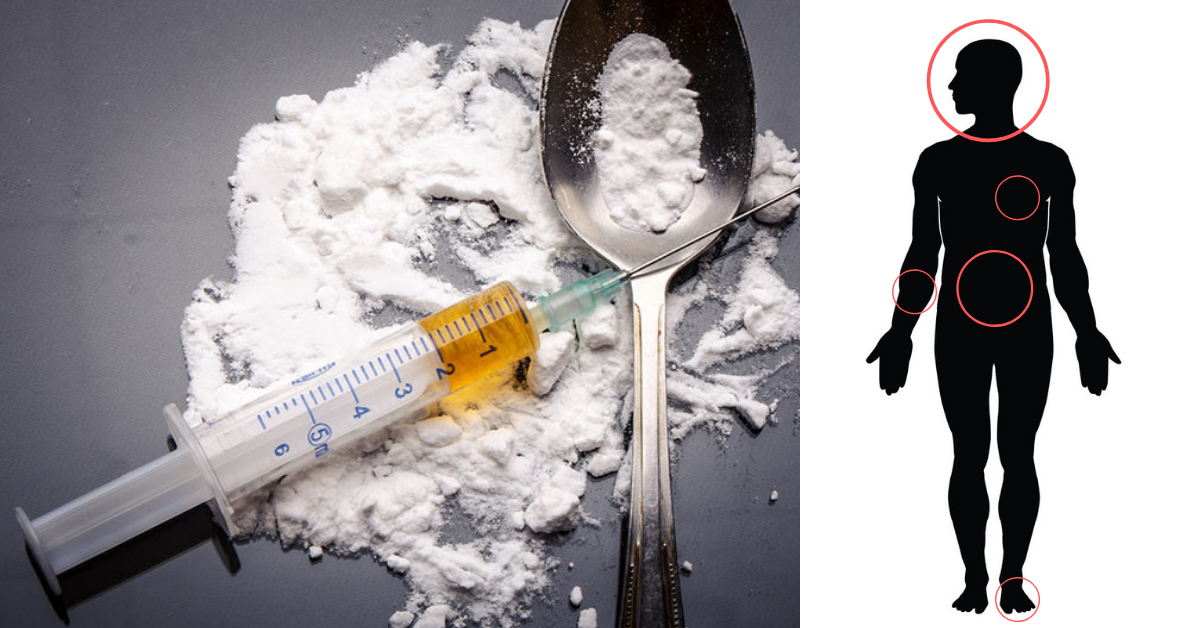Heroin Withdrawal Symptoms and Side Effects On the Body & Mind
Trying to withdrawal from heroin is incredibly difficult for addicts. The side effects from the withdrawal are often so powerful that the person returns to the drug to alleviate the symptoms. “Dope sickness” (the slang term for heroin withdrawal) is often so feared that even those who wish to quit won’t even try; they will continue to use the drug to avoid possibly feeling the withdrawal symptoms.
Heroin affects the part of the brain that controls pleasure and motivation. Once the brain starts receiving opioids from heroin, it will decrease its natural production of opiates. Over time with continued use of heroin, the brain will depend on the drug to provide the opiates it once produced on its own. Soon the individual will become dependent on the drug in order to feel “normal.”
When a person who is dependent on heroin to feel normal decides to quit, the brain will not immediately be able to produce the amount of opiates needed for that individual to feel normal. At that point, withdrawal kicks in.
Short-Term and Longer-Term Heroin Withdrawal Symptoms
Experiencing heroin withdrawal is often compared to having the flu but 1,000 times worse. The symptoms are so uncomfortable that many won’t try to quit because they don’t want to face them, or those who do try to quit return to the drug to get rid of the symptoms.
Heroin withdrawal symptoms kick in at varying times after the last dose of the drug depending on factors such as dosage, frequency of use, duration of use, combination with other drugs, brain chemistry, and more. However, most acute withdrawal symptoms start 8-24 hours after the last dose and include:
- Sweating
- Muscle aches
- Runny nose
- Yawning
- Irritability
- Anxiety
- Sleep issues
- Severe drug cravings
Other withdrawal symptoms can last up to 10 days after the last dose. These symptoms may include:
- Cramping
- Nausea
- Vomiting
- Diarrhea
- Insomnia
- Dilated pupils
How long these withdrawal symptoms last and how severe they depend on the way the drug was consumed, how long it was used, how much was used, and how often it was used.
Understanding How Heroin Affects the Body
Heroin may be snorted or taken intravenously. Although the immediate high may only last a few minutes, the full effects of one dose can last for a few hours. Once the high wears off, the individual may fade in and out of consciousness. Heroin also affects the body in these other short-term ways:
- Dry mouth
- Loss of appetite
- Severe itching
- Constipation
- Mood swings
- Slow breathing
For those who continue to abuse heroin, the drug has several long-term effects on the body, including:
- Collapsed veins
- Tolerance and dependence
- Blood clots due to injection site problems
- Lung infections like pneumonia or tuberculosis
- Stroke
- Overdose
- Liver and kidney damage
- Viral infections like HIV or hepatitis from sharing needles
How Heroin Affects the Brain
As previously mentioned, continued use of heroin fools the brain into thinking that it no longer needs to produce its natural level of opiates since heroin provides opiates for the brain instead. In turn, the brain decreases the natural level of opiates produced, and it needs synthetically-produced heroin (or other opioids) to feel “normal.” At this stage, heroin has already changed the natural reward system in the brain, and this is what created the addiction.
Opioids, however, are not just related to pain relief and a sense of calm. They are also related to our breathing system. A person who uses heroin will experience slowed or depressed breathing, and the less oxygen the brain receives, the less it will be able to help the other systems in our body function properly. This could lead to organ damage.
The Severity of Heroin Withdrawal Symptoms
Heroin withdrawal is not a joke. The symptoms are severe, intense, and often dreaded. With that said, it is absolutely possible to get through withdrawal and on the way to recovery, and it is best to do so with the help of medical supervision. A medically-supervised staff will help make the symptoms more comfortable, help to reduce cravings, and create a short- and long-term recovery plan.
Getting through withdrawal and quitting heroin are two different things. Therapy and counseling are recommended for those looking to quit and stay off the drug. It is not recommended that you try to quit at home, and it is not recommended that you try to quit on your own. If you or a loved one needs help with a heroin detox & rehab and/or needs professional help with heroin withdrawal, you can speak confidentially with one of our treatment experts today. Just contact us here 24/7.


